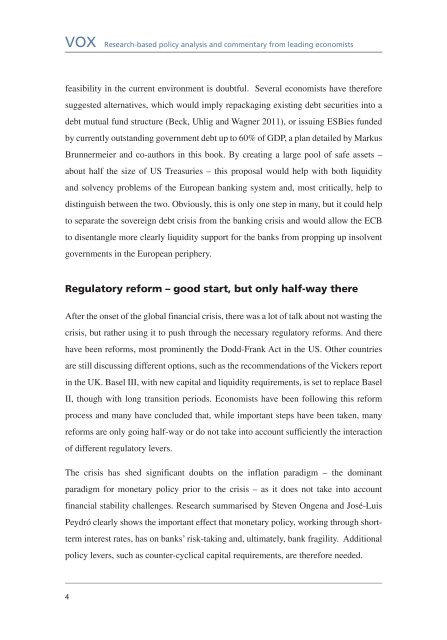You also want an ePaper? Increase the reach of your titles
YUMPU automatically turns print PDFs into web optimized ePapers that Google loves.
VOX Research-based policy analysis and commentary from leading economists<br />
feasibility in the current environment is doubtful. Several economists have therefore<br />
suggested alternatives, which would imply repackaging existing debt securities into a<br />
debt mutual fund structure (<strong>Beck</strong>, Uhlig and Wagner 2011), or issuing ESBies funded<br />
<strong>by</strong> currently outstanding government debt up to 60% of GDP, a plan detailed <strong>by</strong> Markus<br />
Brunnermeier and co-authors in this book. By creating a large pool of safe assets –<br />
about half the size of US Treasuries – this proposal would help with both liquidity<br />
and solvency problems of the European banking system and, most critically, help to<br />
distinguish between the two. Obviously, this is only one step in many, but it could help<br />
to separate the sovereign debt crisis from the banking crisis and would allow the ECB<br />
to disentangle more clearly liquidity support for the banks from propping up insolvent<br />
governments in the European periphery.<br />
Regulatory reform – good start, but only half-way there<br />
After the onset of the global financial crisis, there was a lot of talk about not wasting the<br />
crisis, but rather using it to push through the necessary regulatory reforms. And there<br />
have been reforms, most prominently the Dodd-Frank Act in the US. Other countries<br />
are still discussing different options, such as the recommendations of the Vickers report<br />
in the UK. Basel III, with new capital and liquidity requirements, is set to replace Basel<br />
II, though with long transition periods. Economists have been following this reform<br />
process and many have concluded that, while important steps have been taken, many<br />
reforms are only going half-way or do not take into account sufficiently the interaction<br />
of different regulatory levers.<br />
The crisis has shed significant doubts on the inflation paradigm – the dominant<br />
paradigm for monetary policy prior to the crisis – as it does not take into account<br />
financial stability challenges. Research summarised <strong>by</strong> Steven Ongena and José-Luis<br />
Peydró clearly shows the important effect that monetary policy, working through shortterm<br />
interest rates, has on banks’ risk-taking and, ultimately, bank fragility. Additional<br />
policy levers, such as counter-cyclical capital requirements, are therefore needed.<br />
4














